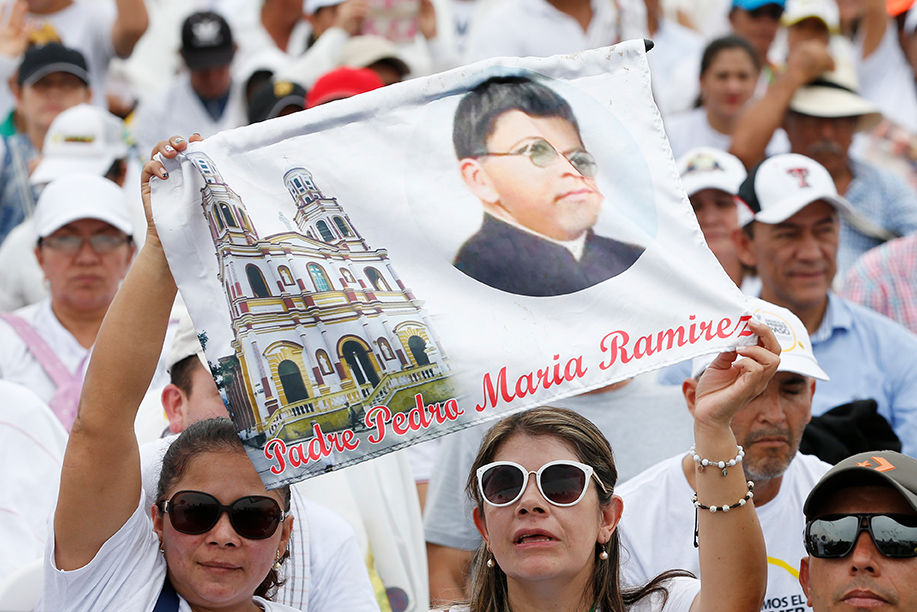During Mass in Colombia on Friday, Pope Francis beatified two martyrs from the country, both of whom were killed in hatred of the faith within the last 60 years. Bishop Jes√∫s Emilio Jaramillo Monsalve and Fr. Pedro María Ramírez Ramos were declared “blessed” by the Pope, moving them further ahead on the road to canonization.
The two martyrs, Francis said, are a sign of God's presence in Colombia, as promised at the end of the Gospel of Matthew, where it says: “I will be with you always, to the close of the age.” They are “an expression of a people who wish to rise up out of the swamp of violence and bitterness,” he said.
Bishop Jaramillo, known for his care of the poor, served as bishop of Arauca. He became a target of the National Liberation Army, a Marxist guerrilla group in Colombia, when he spoke out against their kidnappings and involvement in the drug trade. Members of the guerrilla group kidnapped Bishop Jaramillo and killed him on Oct. 2, 1989. After decades of fighting, the National Liberation Army and the Colombian government arrived at an agreement for a temporary ceasefire earlier this week. It will go into effect Oct. 1.
Born in La Plata in 1899, Fr. Ramirez became priest in 1931. When civil war erupted in Colombia between conservative and liberal groups, he was serving as a pastor in Armero. Local families offered to smuggle him to safety, but the priest refused to abandon his people. On April 10, 1948, he was dragged out of his church by a group of rebels, who accused him of hiding weapons for conservatives. They lynched him in the town square. He died forgiving his killers.
The Pope spoke about reconciliation to large crowds gathered for an outdoor Mass in the Catama neighborhood of Villavicencio in Colombia. He pointed to the martyrs as an example of what it means to make reconciliation concrete. The most powerful protagonists in the peace-building process are those people who have been victims of violence themselves, but have overcome the temptation to act with vengeance, he said.
“What is needed is for some to courageously take the first step in that direction, without waiting for others to do so. We need only one good person to have hope! And each of us can be that person!” he emphasized. This does not mean sugarcoating or ignoring injustice and conflict, he noted. Still, he said, “every effort at peace without a sincere commitment to reconciliation is destined to fail.”
The Holy Family offers an example as well, he said. “How can we best allow the light in? What are the true paths of reconciliation?” he reflected. “Like Mary, by saying yes to the whole of history, not just to a part of it. Like Joseph, by putting aside our passions and pride. Like Jesus Christ, by taking hold of that history, assuming it, embracing it.” “That is who you are, that is who Colombians are, that is where you find your identity. God can do all this if we say yes to truth, to goodness, to reconciliation, if we fill our history of sin, violence and rejection with the light of the Gospel,” he said.
In his homily, the Pope also referenced the day’s Gospel, which tells the long genealogy of Jesus. This long list helps us to keep a good perspective — it shows us what a small part we play in the vast history of the world and integrates into salvation history “those pages which are the darkest and saddest, moments of desolation and abandonment comparable to exile.”
The people of Colombia have their own genealogies, he continued. “Here too we can write genealogies full of stories, many of love and light; others of disagreement, insults, even of death…How many of you can tell of exile and grief!” The genealogy of Christ mentions numerous women, he pointed out. In communities still weighed down with “patriarchal and chauvinistic customs, it is good to note that the Gospel begins by highlighting women who were influential and made history.”
Noting that Sept. 8 is the Feast of the Nativity of the Blessed Virgin Mary, Francis particularly highlighted Mary as an example of the light of reconciliation breaking into the world, because she is “the first light who announces night’s end, and above all, the impending day.” “Her birth helps us to understand the loving, tender, compassionate plan of love in which God reaches down and calls us to a wonderful covenant with him, that nothing and no one will be able to break.” Mary transmits God’s light, he concluded.
And just like Mary, we need to say ‘yes’ to reconciliation, “and sing with her ‘the wonders of the Lord,’ for as he has promised to our fathers, he helps all nations and peoples, he helps Colombia which today wishes to be reconciled; it is a promise made also to its descendants forever.”

